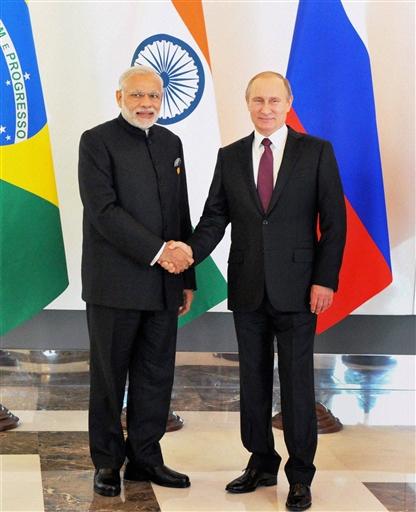Pledging to quadruple India's renewable power capacity to 175 gigawatt by 2022 and cut fossil fuel subsidies, Prime Minister Narendra Modi today asked world's top economies to build support systems focused on nations that have the maximum growth potential. He also asked them to keep infrastructure financing in developing countries as a key priority
Antalya: Pledging to quadruple India's renewable power capacity to 175 gigawatt by 2022 and cut fossil fuel subsidies, Prime Minister Narendra Modi today asked world's top economies to build support systems focused on nations that have the maximum growth potential. He also asked them to keep infrastructure financing in developing countries as a key priority.
ADVERTISEMENT
In his lead intervention at G20 Working Lunch on Development and Climate Change, he offered seven points for consideration which include shift from 'carbon credit' to 'green credit' and increase in share of traffic on public transport in cities by 30 per cent by 2030.
"I propose that we consider how G20 can build support systems that focus on countries with maximum growth potential, help address specific bottlenecks there and facilitate implementation of country strategies," he said, adding that the grouping of world's top 20 economies including US and China must continue to focus on infrastructure.
Clean energy and environment friendly infrastructure, he said, will address both development and climate change. "Bridging the current gap in infrastructure finance in the developing countries should remain our key priority.
"Through bold economic and governance reforms, we have achieved a growth rate of nearly 7.5 per cent with strong prospects for a higher growth rate in the near future," he said. "Given our size and scale, India can become a pillar of global growth and stability."

Prime Minister Narendra Modi shakes hand with Russian President Vladimir Putin at the BRICS meeting, on the sidelines of G20 Turkey 2015, in Antalya, Turkey on Sunday. Pic/PTI
With India being the largest recipient of remittances in the world, Modi asked G20 to cut transaction cost for transferring money from abroad. "Remittances are a key source of income for households and support for the economy in developing countries. We should define a target date before 2030 to reduce the high costs of transferring remittances," he said.
The transaction cost which was about 10 per cent has come down to 7.5 per cent because of sustained campaign by India. The target is to bring it down to 3 per cent by 2030 but Modi wants this to be achieved earlier.
G20, Modi said, was still short on efforts to fulfil last year's commitment to raise collective GDP by an additional 2 per cent by 2018. Stating that the grouping must align itself with the Sustainable Development Goals, he said this will stimulate faster and a more broad-based economic growth.
"The SDGs area comprehensive set of goals that places complete elimination of poverty in the world by 2030 as its top goal. And, it creates the right balance between growth, development, human welfare and environment," he said.
"India's development goals are aligned with the SDGs." India is promoting growth and investing in skills to create employment; increasing the pace and quality of infrastructure expansion; and investing in making far more productive and resilient.
"We in India don't see development and climate change as competing objectives. This is centred on the belief in the unity of humanity and Nature," he said.
Talking of plans for addressing the challenges of climate change, India will raised renewable power generation capacity by 175 GW by 2022, cut in subsidies on fossil fuel and tax on coal and created a USD 3 billion National Clean Energy Fund to promote clean technologies.
"With our highly ambitious/Intended Nationally Determined Contributions (INDCs),India would remain in step with the world," he said. G20 can play an effective role in supporting the multilateral goals of increasing research and development to develop affordable renewable energy. "We should also ensure that finance and technology is available to meet the universal global aspiration for clean energy. We must meet the target of USD 100 billion goal per year by 2020."
Also, G20 countries should increase the share of traffic on public transportation in cities by 30 per cent by 2030 and shift from 'carbon credit' towards 'green credit'. "When we speak of targets, we must not only reduce the use of fossil fuel, but also moderate our life style.
Development in harmony with nature is the goal of my proposal to launch, along with the French President Hollande, an alliance of solar-rich countries at the time of COP-21 meeting (in Paris later this month), he said. Clean energy and environment friendly infrastructure will address both development and climate change, he added.
 Subscribe today by clicking the link and stay updated with the latest news!" Click here!
Subscribe today by clicking the link and stay updated with the latest news!" Click here!






